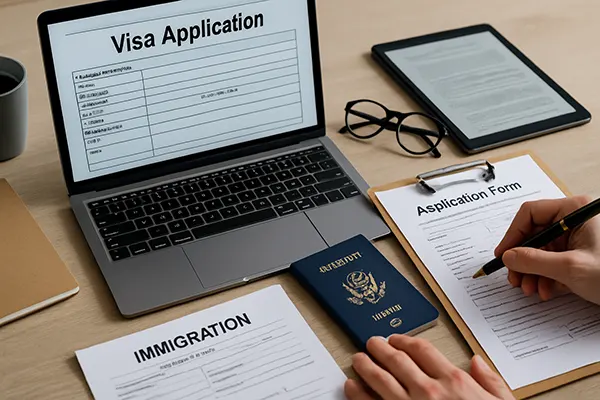
How to Earn by Assisting People with Visa Applications and Appeals Online
In the digital era, remote work opportunities have significantly expanded, enabling individuals to build careers without leaving home. One such promising area is helping people prepare and submit visa applications and appeals online. This niche is especially relevant for those with experience in legal, immigration, or administrative work—or simply strong organisational skills and a desire to assist others. In this article, we’ll delve into how to start, what tools are required, and how to turn this into a sustainable income source by 2025.
Understanding the Demand for Visa Assistance Services
The number of people seeking visas for travel, education, or migration continues to grow, and with it, the demand for clear, error-free applications. Many individuals are overwhelmed by bureaucracy or fear making mistakes that could lead to rejection. This is where remote consultants come in—offering support, explanations, and help with documentation and deadlines. Their role is not legal representation, but practical assistance in navigating the complex paperwork.
Such services are popular among students applying for study visas, workers seeking employment abroad, or families planning reunification. Each case involves unique requirements, so understanding the basic categories of visas and appeal processes is crucial. By building your knowledge over time, you increase the value of your services and earn the trust of clients.
As of 2025, the most in-demand destinations include the United Kingdom, Canada, Australia, the United States, and Schengen countries. Each country has its own application systems and standards, so it’s wise to focus on a few jurisdictions where you can build expertise and offer reliable guidance.
Key Skills and Qualifications for Success
While a legal background is not mandatory, a good understanding of visa types, deadlines, and embassy requirements is essential. Excellent written communication, attention to detail, and the ability to follow complex instructions are also crucial. Fluency in English and at least one additional language can significantly increase your client base, especially when working with applicants from non-English speaking countries.
It’s also important to develop soft skills such as empathy and patience. Clients are often under stress or time pressure, so being able to explain things calmly and clearly makes a difference. In some cases, applicants may require urgent assistance to submit appeals following visa refusals—requiring speed and accuracy from your side.
Certifications in immigration law or paralegal studies can help boost credibility, but they are not obligatory. More often, your portfolio and client testimonials will speak for themselves. Building a strong track record of successful applications is one of the best ways to grow your business.
Tools and Platforms to Manage Your Work Efficiently
To operate effectively, you’ll need a solid set of tools. Start with a reliable computer, secure internet connection, and access to cloud storage (such as Google Drive or Dropbox) for handling sensitive documents. You’ll also need communication tools like Zoom, Skype, or WhatsApp for consultations. Email remains the primary method for sending drafts and collecting feedback, so professional email management is essential.
Document editing software (such as Microsoft Word or Adobe Acrobat) is required for preparing application forms, cover letters, and appeal submissions. Familiarity with embassy portals and online application systems is a must—many require account creation, document uploads, and sometimes biometric appointments. Keeping a checklist for each type of visa helps maintain consistency across applications.
Use task management tools like Trello or Notion to track the progress of each case. Deadlines are critical in this field, especially for appeals, so calendar reminders and scheduling apps will help you stay organised. It’s also advisable to store templates and reference materials for faster work in future cases.
Ensuring Data Privacy and Client Confidentiality
Working with personal data means you must follow strict data protection practices. Use password-protected storage and avoid sharing files over unsecured channels. Ensure that all devices used for work have antivirus protection and system encryption enabled. You may also consider using GDPR-compliant email services or end-to-end encrypted messaging.
Make sure to explain your data handling policy to each client—transparency builds trust. Let them know where their documents will be stored, who will have access, and for how long. Avoid keeping copies of sensitive data longer than necessary and regularly clean up your folders to avoid any accidental leaks.
Consider including a basic privacy policy in your service agreement. Even if you’re not operating a formal business yet, having this documentation in place signals professionalism and reliability. In some cases, especially with clients from the EU or UK, this may be a legal requirement.

How to Find Clients and Build a Steady Income
There are several channels for client acquisition, ranging from freelance websites like Upwork and Fiverr to targeted ads on Facebook or Google. You can also collaborate with local language schools, migration agencies, or travel firms who often need a reliable person to handle administrative steps for their students or customers. Word-of-mouth referrals can quickly expand your client base once you build trust.
Setting your rates depends on complexity and location. For example, a basic student visa application might cost €40–70, while a full appeal case could be priced from €150 and above. Be transparent in your pricing and always provide invoices—this makes you appear trustworthy and helps with future business registration or tax reporting.
As your practice grows, consider building a simple website with a form for enquiries and testimonials from past clients. Over time, this helps you rank better in Google and presents a more professional image. You could also explore creating educational content—such as short guides or videos—to build authority and attract clients organically.
Scaling Your Services and Avoiding Burnout
As demand increases, you might be tempted to accept every case. However, visa and appeal work is mentally demanding, so it’s essential to set boundaries. Use scheduling tools to limit consultations to specific hours and consider building a waitlist when you’re at capacity. Prioritise quality over volume—your reputation depends on the success of your clients.
Eventually, you can expand your service by collaborating with others. For instance, hire assistants for document formatting or customer service. You might also team up with certified immigration consultants for cases requiring legal input. Diversifying your services with translations or travel planning is another way to increase revenue without overstretching yourself.
Burnout is real in this field, especially when dealing with high-stakes situations. Take regular breaks, disconnect after work hours, and maintain a healthy routine. A calm and focused consultant delivers far better results than one constantly under pressure.




